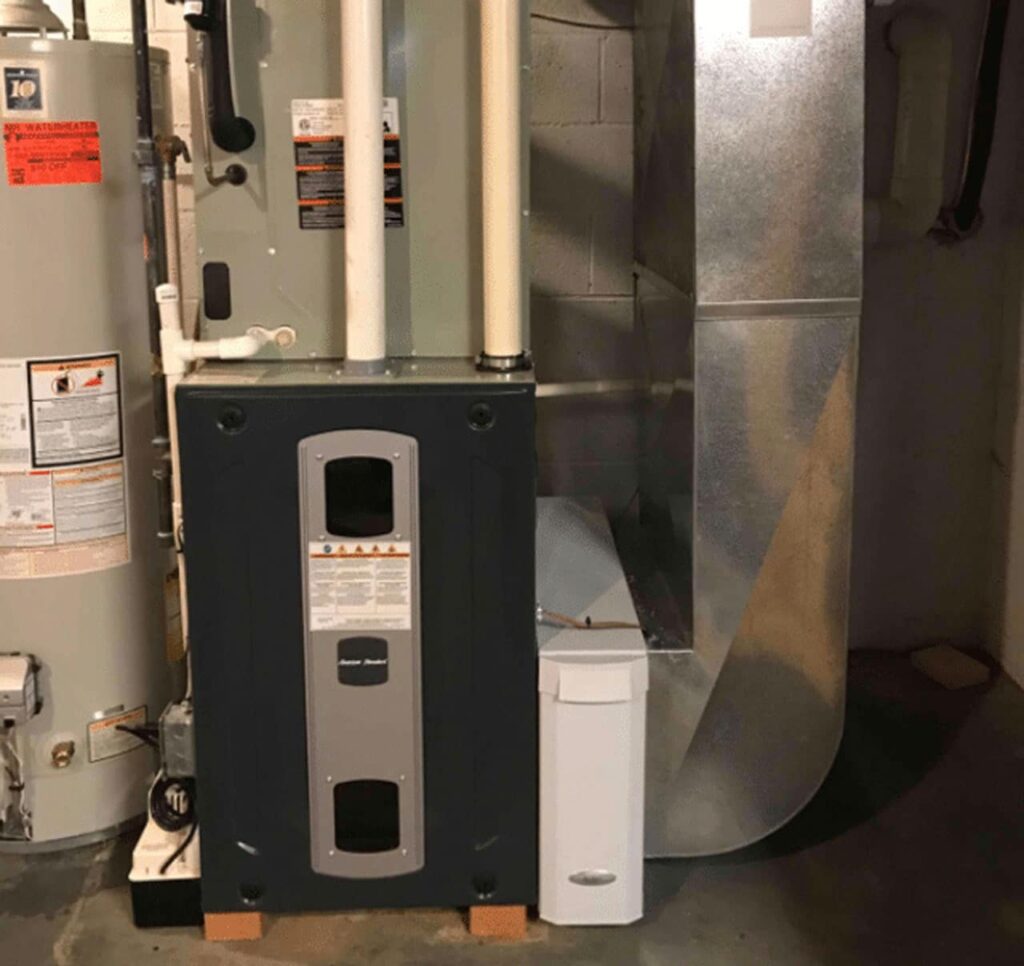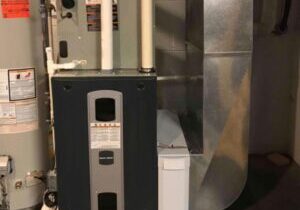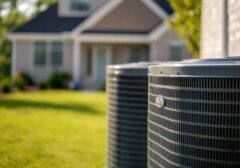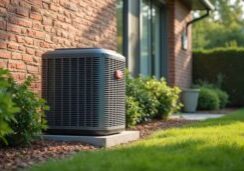Since a furnace is the powerhouse driving your home’s heating and cooling system, you can't take a one-size-fits-all approach when selecting one. There are many important factors to consider when deciding which furnace to purchase for your Pittsburgh area home. In this article we’ll review the different types of furnaces and how to choose the best option for your heating needs.
What is a Furnace?
A furnace is one of the main components (and most important parts) of your HVAC system. When the temperature in your house drops below a predetermined temperature, or if you change the settings on your thermostat, a signal is sent to activate the furnace and begin heating the home. At the same time, a fan switches on and circulates the heated air through your home. How the air is heated depends on the type of furnace you have.
Types of Furnaces
There are four main types of furnaces:
- Natural gas furnaces are highly economical and the most widely used heating source in the US. Newer gas furnaces can be up to 98% efficient, making them a popular choice. In fact, nearly half the country depends on this energy source to heat their homes. Natural gas furnaces work by igniting gas in the combustion chamber to heat a heat exchanger. The blower motor moves air over the heat exchanger and through the ductwork for distribution throughout the home. Combustion byproducts are safely vented outside through a flue pipe. This process continues until the thermostat detects that the desired temperature has been reached.
- Oil furnaces are most commonly found in the northeastern United States and are typically less efficient (between 80-90%) than natural gas furnaces (up to 98%). Oil furnaces can be an appealing option for homeowners that enjoy the comfort a fuel-burning heater provides because oil can be delivered to remote areas where gas lines are not available. However, fluctuating oil prices can impact operation costs, and oil furnaces require more maintenance. Oil furnaces follow the same sequence of operation as a natural gas furnace with the exception being the fuel source.
- Electric furnaces work by sending electricity through a metal or ceramic heating element. The blower motor moves air across the heating elements, and warm air is distributed throughout the home's ductworks system. They typically last longer than natural gas furnaces, and are the cheapest option up front. However, they are about 300% more expensive to operate than gas-burning units. They’re often paired with heat pumps to offset the costs; this combination typically costs less to operate than a traditional gas furnace.
- Propane is a commonly used fuel source in rural areas where natural gas lines are unavailable. Most natural gas furnaces can be fitted with a propane conversion kit to make them compatible. Although propane is more expensive and less convenient than natural gas (it has to be delivered to your home), it is a great option if gas and oil aren’t accessible. It’s also a cleaner-burning fuel, so it’s a good option for homeowners looking for a more environmentally friendly fuel source.
Selecting the Right Type of Furnace
Your budget and the available fuel source(s) are just two of the factors to take into account when selecting the right furnace for your home. When comparing options, Spurk HVAC recommends taking 3 other things into consideration:
- Heating Stages
Natural gas and propane furnaces offer different heating stages. They include:- Single-Stage Furnaces: Run at full capacity whenever they’re on and shut off when the thermostat is satisfied. They’re the least expensive option, but can lead to inconsistent temperatures in the home.
- Two-Stage Furnaces: Operate at a reduced capacity (about 65%) to save energy during milder weather and only kick into second stage during extreme cold. They’re more efficient and provide more even temperature control.
- Modulating Furnaces: Can adjust output down to about 30% capacity and increase output in small percentages up to 100% depending on the demand. They learn your run-time history over time to only give you the heating capacity you need for maximum efficiency and consistency.
- Furnace Reviews
Don’t just go for the cheapest furnace. A lower-priced unit may end up costing more to operate and repair if it runs less efficiently. Customer reviews can provide honest insight into any furnace you’re considering before you make your purchase.If you’re not sure which type of furnace would work best for your home, Spurk HVAC is here to help! Our experienced team is eager to help you navigate the options, offer suggestions, and answer any questions you may have so you can make an educated decision that produces the best results. - Size of Unit
It’s essential to have the right size furnace for your home. This is typically measured in BTUs, and calculating the correct size depends on many factors. The size of your home, how well your ceiling and walls are insulated, ceiling height, and even the number of windows all have to be taken into consideration.
Not sure where to start? Schedule a free replacement consultation with Spurk HVAC. We’ll discuss your budget, review your heating needs, and do a heat load calculation to ensure you get the right-sized unit for your home.
Do Furnaces Qualify for HVAC Federal Tax Credits?
It depends on the furnace. To qualify for the federal tax credits for HVAC efficiency, furnaces must run at a 97% efficiency or higher.
The caveat: the tax credits are only available through December 31, 2025. Spurk HVAC will gladly recommend a qualifying system and help ensure it’s installed before the tax credits expire. See a few of our recommended furnaces below.
What’s the Best Brand of Furnace for Your Home?
As an American Standard dealer and Rheem dealer, we’re proud to recommend the high quality furnaces that both companies offer. Their dependable options have satisfied our Pittsburgh area customers’ HVAC needs time and time again.
Our Recommended American Standard Furnaces at a Glance
| Model | Heating Stages | Annual Fuel Utilization Efficiency | Features | Does It Qualify for 2025 Tax Credits? |
|---|---|---|---|---|
| S9B1 Gas Furnace | 1-Stage | 92% |
| No |
| S9V2-VS Gas Furnace | 2-Stage | 97% |
| Yes |
| Platinum 95 Gas Furnace | Modulating | 97% |
| Yes |
Our Recommended Rheem Furnaces at a Glance
| Model | Heating Stages | Annual Fuel Utilization Efficiency | Features | Does It Qualify for 2025 Tax Credits? |
|---|---|---|---|---|
| R921T Endeavor® Line Classic® Series Gas Furnace | 1-Stage | 92% |
| No |
| R962V Endeavor™ Line Classic Plus Series Gas Furnace | 2-Stage | 96% |
| No |
| R98MV Endeavor™ Line Prestige Series Gas Furnace | Modulating | 98% |
| Yes |
Note: These are not your only options. Each brand has many great heating system options, including pairing your furnace with a heat pump for more energy-efficient heating. Contact Spurk HVAC to discuss all of your furnace options.
Conclusion
Choosing the right furnace for your home can be a daunting task. Knowing your options and feeling comfortable asking the important questions is the first step to finding a system for your home.
If you would like assistance with finding the perfect furnace for your home’s needs, we can help! Contact Spurk HVAC to schedule an in-home consultation and receive guidance from one of our expert team members today.
About Spurk HVAC
Spurk HVAC was formed in 2018 and is located in Warrendale, Pennsylvania. We proudly serve Cranberry Twp., Wexford, Gibsonia, Mars, and the surrounding areas.
We service all makes and models. Please contact us if you are seeking heating repair, heating system replacement, air conditioner repair, air conditioning maintenance, air conditioning replacement, or any other heating & cooling services. Whether you are looking for residential or commercial HVAC services, we look forward to the opportunity to become your preferred HVAC contractor.
Get an Estimate on a New System
Fill out the form below to get an estimate on a new furnace.







